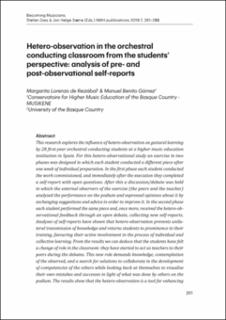Hetero-observation in the orchestral conducting classroom from the students’ perspective: analysis of pre- and post-observational self-reports
Chapter, Peer reviewed
Permanent lenke
https://hdl.handle.net/11250/2827007Utgivelsesdato
2019Metadata
Vis full innførselSamlinger
- Artikler og bokkapitler [390]
Originalversjon
I: Becoming musicians. Student involvement and teacher collaboration in higher music education, s. 261-288Sammendrag
Abstract -
This research explores the influence of hetero-observation on gestural learning by 28 first-year orchestral conducting students at a higher music education institution in Spain. For this hetero-observational study an exercise in two phases was designed in which each student conducted a different piece after one week of individual preparation. In the first phase each student conducted the work commissioned, and immediately after the execution they completed a self-report with open questions. After this a discussion/debate was held in which the external observers of the exercise (the peers and the teacher) analysed the performance on the podium and expressed opinions about it by exchanging suggestions and advice in order to improve it. In the second phase each student performed the same piece and, once more, received the hetero-observational feedback through an open debate, collecting new self-reports. Analyses of self-reports have shown that hetero-observation prevents unilateral transmission of knowledge and returns students to prominence in their training, favouring their active involvement in the process of individual and collective learning. From the results we can deduce that the students have felt a change of role in the classroom: they have started to act as teachers to their peers during the debates. This new role demands knowledge, contemplation of the observed, and a search for solutions to collaborate in the development of competencies of the others while looking back at themselves to visualise their own mistakes and successes in light of what was done by others on the podium. The results show that the hetero-observation is a tool for enhancing individual and collective gestural competencies, and the peer interaction during the debates has served to set in motion mechanisms of motivation and regulation of learning within the group of participants.
Beskrivelse
Paper from the conference "Becoming Musicians. Student involvement and teacher collaboration in higher music education" - Oslo, October 2018.
